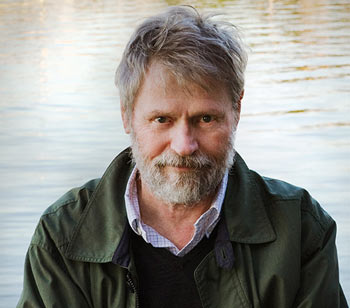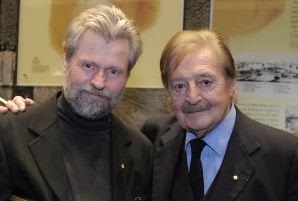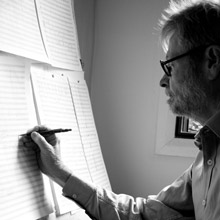PIAF Ross Edwards premiere
Thursday, 12 February 2015
PIAF Ross Edwards premiere
Ross Edwards is walking and listening. This has been his tradition since the seventies when he first developed his unique compositional voice. The 71 year old composer is walking the streets of Balmain, the west Sydney suburb where he lives with his wife Helen. It’s not the harbour views that he sees but Gallipoli Cove at first light. A sorrowful drone begins to play in his head and as he turns for home he decides yes, he will take the commission.

“I always go for a walk after I get a commission and if I get excited by the ideas that come I phone back and commit,” Edwards explains over the phone from Sydney. “I leapt at the opportunity to commemorate Gallipoli; it is such tragic and significant event in our history.”
In the background his wife Helen is sending me emails with information about the Ian Potter Cultural Trust commission. The piece will be premiered by the Australian String Quartet in Albany and Perth as part of the PerthFestival’s commemorations for the centenary of ANZAC Day.
At first glance the war theme is unusual for Edwards, who is best known for his dance-like music depicting Australian bush and wildlife. His concertos (for oboe, shakuhachi, saxophone) are theatrical rituals involving choreography and lighting effects. Many of his pieces incorporate didgeridoo and evoke the sounds of insects and birds.
But the ethos behind his music is in fact well-suited to the Gallipoli topic. Edwards wants his music to act as an agent of healing and ritual – its age-old universal function.
“I want my music to help facilitate our capacity to heal ourselves through spiritual connectedness with the earth,” he says.
And so Edwards’ ANZAC commemoration is a prayer for peace – albeit a very sombre one. The composer requires the four string players to use mutes to veil the sound and they will play in the dark with just pit lights to illuminate the music.
“It is a very inward and fragile work,” Edwards describes. “There are lighter moments but not many. The piece begins with a depiction of ANZAC Cove at first light. There is a sorrowful drone that underpins the work and outbursts of anguish. It is about questioning what it was about and why it happened. I have written it in quite an archaic manner, like an ancient viol ensemble. Towards the end the first violin wanders heavenwards over a prayer for peace from the Agnus Dei of my ‘Mass of the Dreaming’.”
The work, called Gallipoli, was recorded last year [2014] by the ASQ with Kristian Winther playing the ethereal first violin part. Since then Winther and second violinist Ionna Tache have left the ensemble and the work will be premiered by violist Stephen King and cellist Sharon Draper with the replacement violin players yet to be announced. Gallipoli is being premiered during the first tour of the 2015 season which marks the 30th anniversary of the ASQ.
Gallipoli is Edwards’ fourth string quartet; he wrote his first in 2006. Unofficially there are several more including one from his student days at Adelaide University where he studied with Richard Meale, but they were scrapped along with all the works written before Edwards found his own musical language.
The search for his own voice began on his return from Europe in the seventies and while teaching at the Sydney Conservatorium. The dominating model of post-war European art music had left Edwards feeling quite lost. While living in Pearl Bay (ninety kilometres north of Sydney) he began to listen to the sounds in the landscape and used the insects and bird sounds heard on his walks as the skeleton of his new musical style.
“I welcomed back my previous learning and technique but now it was hanging on scaffolding that was me. And now people tell me all my music sounds distinctively like me, either for good or bad I suppose!”
Writing music continues to be a very natural process for him.
“Yes it is a spiritual thing, there is a sense of being in touch with something mysterious. It is also very joyful. I do a lot of sitting to see what comes and I hold onto the good and discard the bad. It is a very trusting experience, especially when there is a deadline!”
Edwards has been awarded both orchestral (2005) and instrumental (2007) work of the year at the Art Music Awards for his works Arafura Dances and Piano Trio. In 1997 he was recognised with an Order of Australia for services to music as a composer.
Some people have suggested Edwards has inherited the mantle of leadership in Australian composition since the death in August of Peter Sculthorpe, regarded as the father figure of Australian music. Edwards is quick to downplay this.
“We are all just composers. Peter was my teacher but I was also taught by Richard Meale and Peter Maxwell Davies. And then one has to be oneself.”

He muses quietly on his friendship with Sculthorpe.
“I knew Peter since I was 19. It is just very sad. He was my best friend with Anne Boyd for 51 years. It is slowly sinking in that I can’t pick up the phone and talk to him about the titles of my works; we used to try out our titles on each other. But his music is still here. He will be remembered.”
And remembering is important. It is why Edwards wrote Gallipoli.
“I want the audience to be transfixed by it. To think deeply about peace. It would be so wonderful if war never happened again. But what can we do? Write music – that’s all I can do.”


